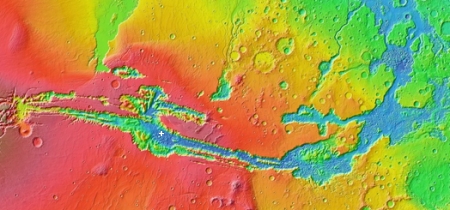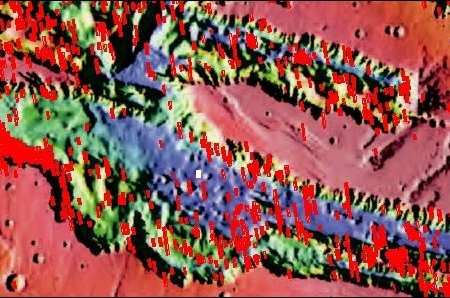A journey into the depths of Valles Marineris

Cool image time! Rather than start with the cool image, let’s begin with the long view. To the right is a wide mosaic of Valles Marineris on Mars, the largest known canyon in the solar system. About 2,500 miles long and 400 miles wide, this canyon is so large that it would cover most of the United States if put on Earth. The Grand Canyon, 500 miles long by 19 miles wide, could easily fit within it and not be noticed. In depth Valles Marineris is equally impressive, with a depth of more than four miles, about four times deeper than the Grand Canyon.

The white cross in the mosaic above is where we are heading. You can see it as the white box in the zoomed in overview to the right. This central part of Valles Marineris is named East Melas Chasma, and the red boxes indicate locations where the high resolution camera of Mars Reconnaissance Orbiter (MRO) has already taken images.
As you can see, we do not yet have many high resolution images of this part of the canyon floor. The white box is the most recent image, and is the subject of today’s post.

Click for full image.
The photo to the right is a cropped section of this recent photograph, taken by MRO on September 15, 2019. While the full image contains lots more weirdness, I have focused on a strange dune field that is also interspersed with larger dunes that for some reason are being eroded on their eastern faces, creating arclike scarps.
The larger dunes are generally several hundred feet in size. Based on the shadow angles I would guess they are probably at least a hundred feet high. Similarly, based on the dune shapes I would guess that the prevalent wind direction comes from the east and blows to the west.

The last image in this sequence zooms into four of the more interesting of these larger dunes to get a closer look at the erosion process that is destroying them. It shows that in several cases, the erosion begins not on the eastern face but on the top of the dunes, producing depressions that eventually lead to the dune’s collapse eastward. It is as if there is some erosion process eating out the inside of the dune, causing sections on the east side, where the wind impacts the dune, to eventually fall away.
What could cause this erosion? Your guess is as good as mine. My first thought is that water ice might be a factor, but this is highly speculative. The changes here could be caused by any number of geological processes, many of which are likely unique to Mars and outside our present geological knowledge.
It will be many decades however before we get to this remote place on Mars to answer these questions. Valles Marineris is generally not considered an ideal first human landing site, because of the terrain and the data that suggests it is not that water rich. Scientifically, there are many other places that scientists want to explore with robots first.
The curious among us will just have to wait, even as these orbital images tantalize us with strange mysteries.
On Christmas Eve 1968 three Americans became the first humans to visit another world. What they did to celebrate was unexpected and profound, and will be remembered throughout all human history. Genesis: the Story of Apollo 8, Robert Zimmerman's classic history of humanity's first journey to another world, tells that story, and it is now available as both an ebook and an audiobook, both with a foreword by Valerie Anders and a new introduction by Robert Zimmerman.
The print edition can be purchased at Amazon or from any other book seller. If you want an autographed copy the price is $60 for the hardback and $45 for the paperback, plus $8 shipping for each. Go here for purchasing details. The ebook is available everywhere for $5.99 (before discount) at amazon, or direct from my ebook publisher, ebookit. If you buy it from ebookit you don't support the big tech companies and the author gets a bigger cut much sooner.
The audiobook is also available at all these vendors, and is also free with a 30-day trial membership to Audible.
"Not simply about one mission, [Genesis] is also the history of America's quest for the moon... Zimmerman has done a masterful job of tying disparate events together into a solid account of one of America's greatest human triumphs."--San Antonio Express-News


Any perceived benefits to a higher atmospheric pressure in the depths of Valles Marineris? Access to the exposed stratification of Mars geology and any exposed ores or minerals may be beneficial.
Jay,
You may be thinking more of the long term exploration of Mars. SpaceX is most likely focusing its priorities on the early steps needed to put man on Mars.
The primary early resource is water. This is very useful for living on Mars, for making fuel and oxidizer for return to Earth, and perhaps for radiation shielding over surface dwellings. Searching for one of the most easily obtained sources of water seems like a good priority for locating the first landing site.
The first SpaceX landing on Mars will certainly be unmanned, and its primary purpose will be to test equipment and methods for extracting and using water and other local resources, as well as testing other equipment that will be needed for early manned missions and early exploration. Will they perform as expected? We will think so when we send it, but we could be unpleasantly surprised when it arrives on Mars.
In our explorations of space and planets, we are continually surprised. Sometimes we find things we had not imagined, and sometimes our equipment does not operate as we had planned.
https://behindtheblack.com/behind-the-black/points-of-information/new-insight-image-of-mole-shows-collapse-of-hole/
Our experiences and knowledge is based upon being on Earth, with our planet’s make-up and the chemistry that results, with our planet’s gravity and the resulting behaviors of materials. We have a tremendous amount of experience with 1 G and some amount of experience with free-fall (zero G), but we have hardly any experience with the Moon’s 1/6th G and no real experience with Mars’s 1/3 G. On Mars, we have photographs of the results of our machinery’s actions, but we have no videos of the machinery in action. Our expectations are all too often dashed by a reality that is literally outside of our own reality.
When NASA’s Mars 2020 goes to Mars, it will take along a flying contraption that we think will perform as expected, but then again, we thought that a “mole” heat probe would be able to dig itself a few meters deep into the Martian soil.
Surprise!
Sir Arthur Eddington was right.